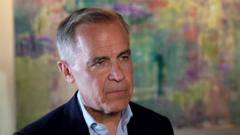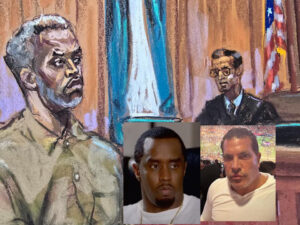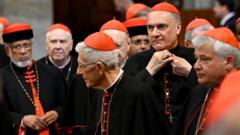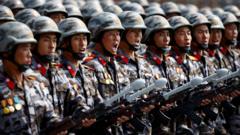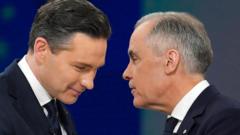As the war between Ukraine and Russia enters a decisive phase, U.S. Secretary of State Marco Rubio has stated that this week could be crucial for discussions surrounding a potential resolution. Reflecting on ongoing diplomatic efforts, Rubio noted that President Trump has yet to implement new sanctions on Russia, emphasizing a preference for a diplomatic solution. This follows a recent meeting between Trump and Ukrainian President Volodymyr Zelensky at the Vatican, where discussions of a possible peace deal were held.
**Critical Crossroads: U.S. and Ukraine Navigate Potential Peace Talks with Russia**

**Critical Crossroads: U.S. and Ukraine Navigate Potential Peace Talks with Russia**
In the face of ongoing conflict, U.S. Secretary of State Marco Rubio indicates a pivotal week for Ukraine-Russia negotiations as Washington weighs its involvement in potential peace efforts.
Trump, in a televised interview, suggested that Zelensky may be willing to concede Crimea—a region annexed by Russia in 2014—in exchange for tranquility, a claim that draws skepticism from Kyiv, which has historically rejected territorial compromises. "There are reasons to be optimistic, but we are not close enough," Rubio remarked, cautioning that the success of any negotiation hinges on both parties' genuine desire for peace.
Amidst these developments, Trump expressed doubts about President Putin's commitment to ending hostilities, citing the loss of life as a primary concern. Following their meeting, Trump described Zelensky as appearing more at ease compared to their previous interactions, further igniting speculation about the direction of future negotiations.
Germany's Defense Minister Boris Pistorius echoed concerns regarding potential concessions, warning that Ukraine should not succumb to proposals that could be interpreted as capitulation. His remarks underscore a broader debate over the feasibility and morality of territorial compromises in pursuit of peace.
The details of any impending negotiations remain murky, with reports suggesting the U.S. may push for recognition of Russia's annexation of Crimea as part of a broader framework for a ceasefire. In stark contrast, European allies are advocating for security guarantees for Ukraine, showcasing a complex geopolitical landscape as the war continues to unfold.
As the U.S. contemplates its strategic options, the future remains uncertain for both Ukraine and Russia, each grappling with the repercussions of past decisions and the quest for a viable path forward. This critical juncture in conflict resolution will undoubtedly shape the trajectory of U.S.-Ukrainian relations and the broader geopolitical climate in Eastern Europe.
Amidst these developments, Trump expressed doubts about President Putin's commitment to ending hostilities, citing the loss of life as a primary concern. Following their meeting, Trump described Zelensky as appearing more at ease compared to their previous interactions, further igniting speculation about the direction of future negotiations.
Germany's Defense Minister Boris Pistorius echoed concerns regarding potential concessions, warning that Ukraine should not succumb to proposals that could be interpreted as capitulation. His remarks underscore a broader debate over the feasibility and morality of territorial compromises in pursuit of peace.
The details of any impending negotiations remain murky, with reports suggesting the U.S. may push for recognition of Russia's annexation of Crimea as part of a broader framework for a ceasefire. In stark contrast, European allies are advocating for security guarantees for Ukraine, showcasing a complex geopolitical landscape as the war continues to unfold.
As the U.S. contemplates its strategic options, the future remains uncertain for both Ukraine and Russia, each grappling with the repercussions of past decisions and the quest for a viable path forward. This critical juncture in conflict resolution will undoubtedly shape the trajectory of U.S.-Ukrainian relations and the broader geopolitical climate in Eastern Europe.

